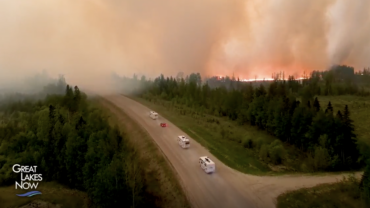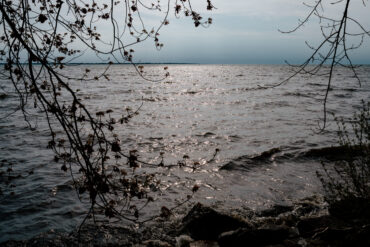-
 ClevelandFeature ClevelandFish, Birds and AnimalsInvasive SpeciesLatest NewsNewsOhioRecreation and TourismResearch, Data and TechnologyScience, Technology, ResearchTourism
ClevelandFeature ClevelandFish, Birds and AnimalsInvasive SpeciesLatest NewsNewsOhioRecreation and TourismResearch, Data and TechnologyScience, Technology, ResearchTourismCleveland Metroparks lets the dogs out in the hunt for spotted lanternflies
-Scent-tracking dogs Bronco, Juno, Argent and Rio, alongside their owners, spent the last four months searching for and removing spotted lanternfly egg masses before they hatch in May.
-
 Blue EconomyBlue EconomyCollaborationCommercial FishingFeature HomepageFish, Birds and AnimalsGreat Lakes News CollaborativeIndustry, Energy, Economic DevelopmentLatest NewsNewsPolitics, Policy, Environmental JusticeRecreation and TourismRecreational Hunting and FishingScience, Technology, ResearchThe Blue EconomyU.S. and Canadian Federal Governments
Blue EconomyBlue EconomyCollaborationCommercial FishingFeature HomepageFish, Birds and AnimalsGreat Lakes News CollaborativeIndustry, Energy, Economic DevelopmentLatest NewsNewsPolitics, Policy, Environmental JusticeRecreation and TourismRecreational Hunting and FishingScience, Technology, ResearchThe Blue EconomyU.S. and Canadian Federal GovernmentsKeeping the $5.5 billion Great Lakes fishery afloat as Trump administration considers cuts
-Federal budget cuts proposed by the Trump administration could cause significant disruption in the efforts to restore and sustain fish populations in the Great Lakes.
-
 Climate ChangeFeature HomepageGreat Lakes News CollaborativeLatest NewsNewsResearch, Data and TechnologyScience, Technology, Research
Climate ChangeFeature HomepageGreat Lakes News CollaborativeLatest NewsNewsResearch, Data and TechnologyScience, Technology, ResearchIntense rainfall means more floods. What can we do?
-Since 1970, U.S. cities have experienced increased hourly rainfall intensity, with the Great Lakes region being among the most affected areas.
-
 Commercial FishingFish, Birds and AnimalsIndustry, Energy, Economic DevelopmentLatest NewsMichiganNewsRecreation and TourismRecreational Hunting and FishingScience, Technology, Research
Commercial FishingFish, Birds and AnimalsIndustry, Energy, Economic DevelopmentLatest NewsMichiganNewsRecreation and TourismRecreational Hunting and FishingScience, Technology, ResearchWhy smallmouth bass are getting bigger in Michigan waterways
-“It’s been a real boom, and a lot of people will say that the good ole days in bass fishing are now.”
-
 Feature HomepageFoodForests and PlantsLatest NewsNewsRecreation and TourismResearch, Data and TechnologyScience, Technology, ResearchTourismWisconsin
Feature HomepageFoodForests and PlantsLatest NewsNewsRecreation and TourismResearch, Data and TechnologyScience, Technology, ResearchTourismWisconsinOne man’s quest to bring more of North America’s largest native fruit, the pawpaw, to Wisconsin
-Adam D’Angelo’s work includes planting an orchard in Spring Green this year to research and develop new varieties of the pawpaw fruit.
-
 Climate ChangeForests and PlantsHistory and CultureIndigenous CommunitiesLatest NewsMinnesotaNewsResearch, Data and TechnologyScience, Technology, Research
Climate ChangeForests and PlantsHistory and CultureIndigenous CommunitiesLatest NewsMinnesotaNewsResearch, Data and TechnologyScience, Technology, ResearchWildfires are getting worse. Can an old technique help control them?
-The Great Lakes will likely see more wildfires, but Ojibwe land practices could reduce future risks.
-
 Algae BloomsCollaborationDrinking WaterLake ErieLatest NewsNewsPolitics, Policy, Environmental JusticeResearch, Data and TechnologyScience, Technology, ResearchU.S. and Canadian Federal GovernmentsWater Quality and Restoration Efforts
Algae BloomsCollaborationDrinking WaterLake ErieLatest NewsNewsPolitics, Policy, Environmental JusticeResearch, Data and TechnologyScience, Technology, ResearchU.S. and Canadian Federal GovernmentsWater Quality and Restoration EffortsMillions of People Depend on the Great Lakes’ Water Supply. Trump Decimated the Lab Protecting It.
-The Trump administration’s slashing of budgets and staff have Great Lakes scientists concerned that they have lost the ability to protect the public from toxic algal blooms, which can kill animals and sicken people.




